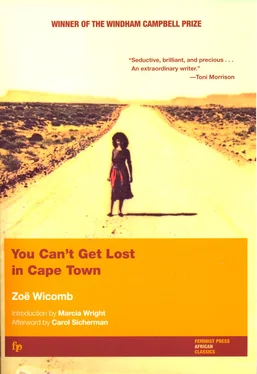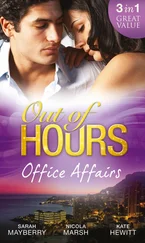He had come to shear, then stayed to plough for Baas Karel — there were not many who had learnt to drive a tractor. One day he returned with a sheep from Baas Karel’s flock. It was simple, he said, the sheep had collapsed in the heat and they were hungry.
‘Hungry, are we not?’ he challenged, but they all remained silent and Skitterboud narrowed his eyes and shook his head and shifted on his haunches saying, ‘It isn’t right. Baas Karel will shoot every one of us. The sheep are sacred to him.’
Giel looked at him musingly then waved a reckless hand, ‘Fuck Baas Karel.’ He sharpened a knife on a slab of blue stone and she, Meid, was the first to rise. She held a bucket under the animal’s throat and watched the hot blood foam into it. She built a fire; the offal had to be scraped that night. Fat from the roasting ribs spluttered on the coals and with the woodsmoke sent a maddening smell into the night air. No one could resist, and the children asked quietly for more. Later, as she helped him to hang out the meat for drying, their eyes met and clung to the moment. He rubbed his head shyly as if to check that the convict’s skull had not reappeared.
Meid rose.
The sand had dried out prematurely with all that raking, leaving the grey stain of salt.
Shit shit shit, she cried into her empty hands. For once the children were quiet, watching her with awe.
Skitterboud’s story is yellow with age. It curls without question at the edges. Many years have passed since the events settled into a picture which then was torn in sadness and rage so that now reassembled the cracks remain all too clear. They soften a facial line here and pinch into meanness a gesture elsewhere. A few fragments are irretrievably lost. Or are they? If I pressed even further.
Such, however, is my excuse for having constructed this portrait: the original has long since ceased to exist for him; only here is the story given its coherence. I am after all responsible for reassembling the bits released over the days that I sought him out as he moved with the winter sun around the pondok. We shouted above the sound of Boeremusiek crackling from a radio with tired batteries.
I am uneasy. He knows that I am after the rest of the story and there is of course my original reason for seeking him out. I can see no other way of getting through this visit after years away from the place of my birth. The silence of the veld oppresses me. I need dagga. In spite of his crumpled Sunday tie and talk of going to church, I suspect him of rolling a regular dagga pil. On a Saturday afternoon he would strum his tin guitar and beat out a dust outside his pondok with a truly remarkable shudder of the legs and he would sink down, pooped, saying, ‘Skitterboud, that’s what they call me,’ his pupils dilated in narcotic bliss. These legs will go on shimmering for years. But you have to dance on your own these days, no one has time to dance anymore, or makes a decent guitar. I don’t know what these Namaquas are coming to.
I do not have the courage to ask about the dagga. I am content with the story.
Today he looks tired. His face is a nicotine brown and pillow-down waves helplessly in his hair. I ought to leave him alone; besides, he is wary and will be on the lookout for leading questions.
We measure the efficiency of our eyes. I am amazed at how well he sees from those slits, banked up with wrinkles and sunken behind the high cheekbones that threaten to pierce through the skin. Yes, he can see the blue megalithic outcrop in the distance and the lone thorn tree on the horizon and the clump on the right which he tells me is a flock of sheep. And then I realise that he knows the veld as he does the lines of his hand; no degree of myopia or astigmatism can blur the topography. He had driven the sheep towards Bloukrans himself; he knows from the position of the sun that they will now be resting in the sparse shade of the dabikwa trees. He does not know how much he actually sees. I hand him my spectacles and his face cracks with surprise. Clearly his vision is improved and he mutters with wonderment as he steps around the house to gaze about the veld. He will not tell me of the things he discovers, of how the veld has aged. Have I ruined it for him? This, he says, tapping at the frames, is just precisely what I want. Then he whips them off and balances on his heels as he tells.
‘Those merinos were the death of me. The short-tailed Dorper, that’s the sheep for this veld, or even the fat-tailed Afrikaner, but the merino is as wayward as a young woman. No doubt sweating under that hot coat she is always restless, disobedient, leading the others astray. You should see them on shearing day trying to scale the walls like monkeys, even though they like nothing better than losing those heavy expensive coats. Ooh, I may be rickety now, but yes, I was the prize shearer in my day. All of us Septembers of Rooiberg, all the brothers and uncles and cousins, were good shearers, but I was the best, the chief shearer. The Boers would travel miles in their shiny motor cars in search of me.’
He puts on the spectacles and with the right hand shading his eyes he scans the horizon in a pantomime search.
‘Did you find the merinos?’ I ask.
‘Which?’ He bores a stick into the ground.
‘You know,’ I insist, ‘the Boer’s.’
‘Which Boer’s?’ he repeats stubbornly.
I swallow. I will have to use his term. There is no getting round it.
‘Baas Karel’s.’ And the word Baas drowns in my mouth, flooded with gall. I will not be foxed by him. He is amused by my repugnance at the word Baas. I retaliate with a direct question.
‘I mean the day you were asked to round up the sheep for a count. Did you find the merinos?’
He drags the stick to and fro in the dust before he looks up to say, ‘Yes, it was a long day. I didn’t get home till late, and in my bag the puniest piece of kambroo you have ever seen. It was too dry that spring.’
‘And Meid?’ I pressed.
‘Gone. They had all gone. Filled the buckets with water and left. That night they all slept under Giel’s new roof.’
‘And she had really said nothing?’
‘No, there was no need. But I had hoped. She was a smart one that Meid, nothing could stop her. I think you had better leave these glasses with me. They’ll be of greater use here in the veld. If you put your mind to it you could see right over a hill with these, and if that’s no good, through the clouds into heaven.’
‘No, they’ve been made specially for my eyes. You should go and see the doctor and get him to make up a pair to suit you. Pensioners get concessions on such things so it shouldn’t cost much.’
‘I saw Dr van Zyl last year. You know Dr van Zyl, always a joke and a slap on the back. Well, he said to me, “Skittie you need a nose to wear glasses. Next time you’ll be asking me to replace your baboon’s nose.” And that was it. Anyway, I don’t have any papers and you need certificates before you’re given pension. They say I’m too young, see I move too fast for pension, and the young baas poked about in my mouth and said I had too many teeth left. Now my mamma and tata knew we were there without any papers from a magistrate. They told us to keep away from magistrates, said magistrates bring nothing but trouble. As a young man I thought I knew better, but you should pay heed, my child, to the elders. They know what’s right,’ and as I snorted he came to the point. ‘I see you’ll have to leave these with me.’
‘It’s not that I don’t want you to have them, they’re just no good to you. It will damage your eyes wearing glasses not specially prescribed for you.’
‘But I can see better with them.’
‘That’s not the point.’
‘But it is precisely the point.’ He looks at me sympathetically. ‘You’ve been to school for so many years and you still believe everything they tell you. It’s those magistrates again, they’ll be behind this nonsense for sure. Who can know better than myself whether these glasses are good for me or not?’
Читать дальше












